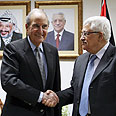
On May 4th, the head of the Military Intelligence research division, Brigadier General Yossi Baidatz, claimed that "(Palestinian President) Abbas is laying the groundwork for the failure of the talks." This comment reveals a very troubling question: Is the diplomatic-security establishment no longer analyzing Palestinian strategy? Perhaps they believe there is no need to develop a counterstrategy.
Why does Baidatz believe that Abbas is laying the groundwork for the failure? Recent demands from the Palestinian Authority have included: Transferring lands that were previously under Palestinian control back to the PA, strict enforcement and extension of the Israeli settlement freeze and expanding this freeze to include east Jerusalem. On May 2, Abbas said "The objective (of proximity talks) is to restore within a few months the situation in the territories to the way it was before the intifada.”
I believe a larger strategy is at play. The Palestinians have been operating according to a strategy written by an American. The PA has crafted a strategy based on the positions of US Special Envoy to the Middle East, Senator George Mitchell.
Senator Mitchell led an investigatory committee, tasked by President Clinton, to create a plan to end the violence at the outbreak of the second intifada, rebuild confidence between the parties and resume negotiations. The Mitchell Report of 2001 outlines the PA demands of today as preconditions to the resumption of direct negotiations. The report states: “The Government of Israel should freeze all settlement activity…The IDF should consider withdrawing to positions held before September 28, 2000.”
PA demands, however, do not represent the full scope of the Mitchell Report. Instead, they pick and choose from the demands Mitchell placed on Israel. The weakness of the PA strategy can be found in the Mitchell Report’s demands on the PA.
Avoiding isolation
In the report, Mitchell clearly outlined the order of priorities to restart negotiations. The first demands listed are to end the violence and to “identify, condemn and discourage incitement in all its forms.” Next, “The PA should make clear through concrete action … that terrorism is reprehensible and unacceptable and that the PA will make a 100% effort to prevent terrorist operations and to punish perpetrators.” No American official can claim that the Palestinians are in compliance with these demands.
Only after issuing demands to fight terror and incitement does Mitchell call for a freeze in settlement construction. This is Mitchell’s prioritized list of what must happen in order to produce fruitful negotiations.
The government of Israel has made an advance payment to begin proximity talks, by freezing settlement construction in the West Bank for 10 months. Moving forward, it is important that Israel develop a coherent counterstrategy which addresses Mitchell’s core beliefs of how this conflict should be resolved. In order to be effective, the strategy must highlight the weaknesses of the PA’s strategy.
The Israeli diplomatic-security establishment must understand the characters involved in the day-to-day negotiations, the issues that are important to them and the influence they hold over the American president.
It is time for Israeli leaders to recognize the importance of the Mitchell Report, his history as Senate Majority Leader, and his diplomatic experience in Northern Ireland. This information provides a window into Mitchell’s negotiating style and provides insight into the issues he holds dear. This kind of thinking would have helped Israel manage tensions with the United States over the past year.
Understanding Mitchell is key to understanding how he will lead proximity talks. Understanding Palestinian thinking is critical to developing an effective Israeli strategy. Otherwise, Israel may find itself isolated and unprepared in the face of Palestinian demands.
Adam Cutler is a former Legacy Heritage Fellow and Senior Foreign Policy Coordinator in the Israel National Security Council















